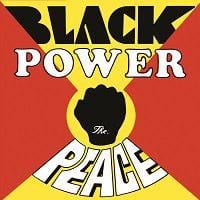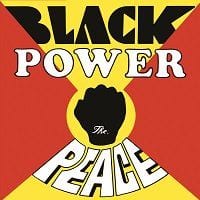
In an era full of funk and Afrobeat, the Peace was something different, a Zamrock band full of 1960s-era flower power and riffs from the dawn of psychedelia. Black Power, the group’s only extant recording, takes iconic ’60s styles and themes and makes them sound just as authentic in 1970s Zambia as they did in the Summer of Love. It’s a short album, but also one full of direct calls for peace (of course), revolution, and love over groovy guitars and feel-good melodies.
The psych is strong from the very first track, a hypnotic, straightforward track calling for black power across the world. With tight guitars and quick beats, this is as close to funk as the Peace gets, a mix of flavors in the spirit of Stand!-era Sly and the Family Stone, but with a little less brass and a little more rock ‘n’ roll.
After “Black Power”, the album quickly gets fuzzy and free. Here in the present, some 40-odd years later, it’s an indulgence into nostalgia and romance: “I Have Got No Money” is a slow, soothing ballad of penniless love that sounds like a summer breeze and echoes in luscious stereo, a simple and bittersweet embrace, a timeless love song that pulls at the heartstrings without even trying. Lyrically, it’s a Zambian version of the Grass Roots’ “Let’s Live for Today”, with that same pure, youthful sentiment of carpe diem. The Peace’s softer side comes through more than once on Black Power, and is always a thing of beauty, a vulnerable aspect that is a rare find on Zamrock albums from the same time. It also blends well with more traditional Zambian sounds, as on “Ubwalwa Ne Chamba”, a track that starts with lilting electric guitars and ends in a frenzy of drums.
It’s not all daisy chains on Black Power, of course; there’s plenty of grit to break up the lovefest, gems like “I Don’t Know”, which sounds like early Beatles with a little more soul, and “Peaceful Man”, a song with such an electric bite to it that Hendrix himself could start singing after the introduction and no one would bat an eye. The best, though, is saved for last: “Get On the Way”, a nine-minute epic that starts out like languid, bluesy poetry, all long notes and melancholy, and then revs up into the best road trip song, one for driving through deserts on empty freeways, one for burning fuel and chasing the sunset while throwing cares to the wind. It’s a psychedelic masterpiece, multi-textured and full of fire, the perfect ending point for an album all about moving forward in every way.
As sweeping a statement as it may seem, every listen of Black Power confirms that nothing else quite compares to the Peace. There’s no doubt that this is a group just as deserving of Zamrock stardom as the prolific Ngozi Family or the ever-changing WITCH, but the Peace still stands alone. Black Power sounds as good next to Buffalo Springfield or even, at times, Creedence Clearwater Revival as it does next to Rikki Ililonga, and is an album that, with only eight tracks, shows more versatility than most pop groups do in eight releases. Superb and well-preserved, Black Power is not only an essential to any Zamrock collection, but an album that will, in fact, make anyone cooler with a single listen.

